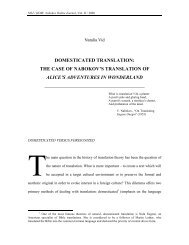Nabokov's Invitation to Plato's Beheading
Nabokov's Invitation to Plato's Beheading
Nabokov's Invitation to Plato's Beheading
- TAGS
- beheading
- etc.dal.ca
Create successful ePaper yourself
Turn your PDF publications into a flip-book with our unique Google optimized e-Paper software.
NOJ / НОЖ: Nabokov Online Journal, Vol. I / 2007<br />
death. Nabokov’s readers are habitually cheated of a chance <strong>to</strong> glimpse at afterlife the<br />
way his dead characters, no matter how imaginative they may be, are cheated of<br />
immortality al<strong>to</strong>gether. As it happens <strong>to</strong> Edmund, a hero of Nabokov’s play Death, an<br />
imaginative person can tell us something about death only by imagining himself dead. 9<br />
This may be as far as Nabokov and Pla<strong>to</strong> could possibly take us when writing about<br />
death.<br />
Such affinities between the two writers suggest that <strong>Invitation</strong>’s reference points<br />
are more diverse than previously thought. Apart from creating recognizable parallels<br />
between Cincinnatus and, for example, Jesus, John the Baptist, and the Gnostics,<br />
Nabokov’s novel intentionally evokes such works of antiquity as Pla<strong>to</strong>’s Phaedo, and<br />
possibly (a subject for another essay) Boethius’ Consolation of Philosophy. 10 Such<br />
conclusion, however, does not make it easy for us <strong>to</strong> understand Nabokov’s motive<br />
behind the Pla<strong>to</strong>nic theme in his novel. If Nabokov introduced Pla<strong>to</strong>nic references merely<br />
as a joke, an example of a writer who failed <strong>to</strong> grasp the mystery of death, then we can<br />
conclude that Nabokov misread Pla<strong>to</strong>’s highly literary works treat the subject of afterlife<br />
in a way as complex as Nabokov’s own approach. Arguably, he underestimated Pla<strong>to</strong>’s<br />
appreciation of art which is cleverly hidden in the numerous and misleading expressions<br />
of the philosopher’s disregard for art. Pla<strong>to</strong> has <strong>to</strong> be appreciated not only as a<br />
philosopher but also a literary figure—the way Nabokov can be admired for his artistry as<br />
well philosophic insight. We can recall Nabokov’s words that a great novel unites “the<br />
9 Nabokov’s Smert’ is one of his earliest works, a nearly forgotten play written in Russian, in verse.<br />
Still untranslated in<strong>to</strong> English, the play’s short summary is available in Brian Boyd’s Vladimir Nabokov:<br />
The Russian Years (204).<br />
10 Boethius (480-524 AD) was a philosopher and statesmen who was unjustly persecuted and executed<br />
for conspiracy against King Theodoric. While awaiting his execution, he wrote a work titled Consolation of<br />
Philosophy which, in Pla<strong>to</strong>nic fashion, combines philosophical and artistic pursuits.
















